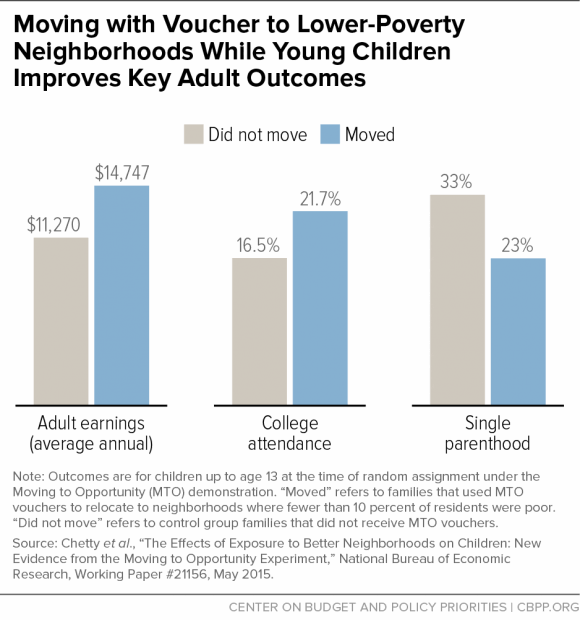BEYOND THE NUMBERS
The House Republican poverty plan includes some problematic changes in low-income housing policy, but also several promising ones to expand opportunity for low-income families. To make housing vouchers more “portable,” enabling more voucher holders to move to areas with more jobs, better schools, and other opportunities, it urges consolidating administration of the voucher program and letting non-profits “and other cost-effective service providers” administer vouchers.
Given the powerful new evidence that neighborhoods have a large influence on children’s well-being and long-term success (see graph), the House should make modest but important investments to support these recommendations when it considers its 2017 funding bill for the Department of Housing and Urban Development (HUD).
As our recent report explains, in most metropolitan areas, one agency administers the voucher program in the central city and one or more different agencies serve suburban areas. In 44 of the 100 largest metro areas, ten or more agencies administer the program. Rental units in safe neighborhoods with good schools may be more plentiful in suburban areas than in the central cities, but the balkanization of metro-area voucher programs among numerous agencies impedes the use of vouchers in higher-opportunity areas. It’s also less efficient.
A growing number of agencies want to develop or strengthen regional collaborations to support housing mobility but lack the needed administrative funding. To provide such funds to about ten regions, the House should approve in its 2017 HUD funding bill the Administration’s proposed $15 million for a Housing Choice Voucher Mobility Demonstration. The Senate-approved bill includes $11 million for this purpose plus $3 million to research what strategies are most effective, but the House Appropriations Committee-approved bill omits similar funding.
Another impediment to voucher portability is that both the agency that issues the voucher and the agency that administers it in the destination community lose money because they must split the voucher’s administrative funding. A recent study recommends paying destination agencies 100 percent of the cost of administering the voucher on an ongoing basis — up from the current 80 percent — while continuing to allow the issuing agency to receive 20 percent of the fee for its initial costs and the time involved in transferring the HUD funds it receives for the voucher to the destination agency. To implement this recommendation, the 2017 HUD appropriations bill must enable HUD to pay for administering vouchers across jurisdictional lines and to reward agencies that increase families’ access to higher-opportunity areas.
The House also should give agencies more adequate administrative funding. In 2016, agencies are receiving only 84 percent of the voucher administrative fees for which they’re eligible because policymakers didn’t appropriate enough money to cover the full amounts. Without additional funding, few agencies will have the resources needed to help more families with vouchers rent in higher-opportunity areas, such as by marketing the program to more landlords. The House can expand families’ access to more opportunity-rich neighborhoods by providing additional housing voucher administrative funds; the Senate bill includes $119 million for this purpose, but the House committee bill included no increase.

